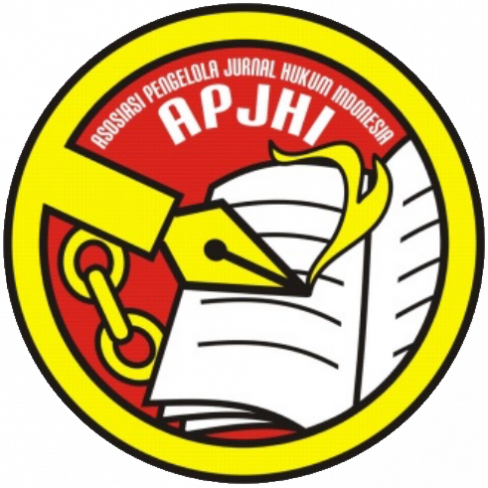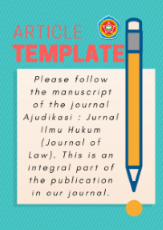Independensi dan Urgensi Restrukturisasi Sistem Peradilan Pidana Indonesia Berdasarkan Aspek Kekuasaan Kehakiman
DOI:
https://doi.org/10.30656/ajudikasi.v5i1.2740Keywords:
Independence, Criminal, Justice, Reconstruction, JudicialAbstract
Settlement of crimes by the criminal justice subsystem as a whole often does not run optimally. The position of the subsystems that are under the executive branch is sometimes used as a tool by the authorities to achieve their political goals regardless of the prevailing legal principles. This study aims to provide an overview of the position and function of criminal justice subsystems and focuses on finding the ideal system concept so that the implementation of an independent criminal justice system can be optimally realized by implementing a systems approach and restructuring the legal system. This study uses a normative juridical research method with a statute approach which is studied using a descriptive analysis. Based on the research results, the components of the criminal justice subsystem seem separate from one another, giving rise to sectoral egos and not yet showing the independence of each criminal justice subsystem. On that basis, to create an integrated, free and independent criminal justice system without any influence from power, it must provide a clear space for judicial independence (judicial power), thus placing the Supreme Court as the supervisor and controller of the entire criminal law enforcement process. The criminal justice subsystems must be under one door, not fragmented in other state institutions so that it is hoped that these subsystems can work optimally and be free from the influence of power.
Downloads
References
Ackerman, Bruce, (2000), “The New Separation of Powerâ€, The Harvard Law Review, Volume 113
Afifah, T., Fuqoha, F., & Sukendar, S. (2021). Implikasi Ideologi Pancasila pada Gerakan Sosial Islam dalam Prinsip Demokrasi Konstitusional. Ajudikasi : Jurnal Ilmu Hukum, 4(2), 181-191. https://doi.org/10.30656/ajudikasi.v4i2.3003
Ali, Mahrus, (2013). Asas, Teori & Praktek Hukum Pidana Indonesia, Yogyakarta: UII Press
Appuldnopsanji, Hari Sutra Disemadi, Nyoman Serikat Putra Jaya, (2021) Reformasi “Sistem Peradilan Pidana Indonesia Berwawasan pancasilaâ€, Kertha Wicaksana: Sarana Komunikasi Dosen dan Mahasiswa, Vol.15, No. 1
Arsheldon, Samuel, Supriardoyo Simanjuntak, Kornelius Benuf, (2020), “Strategi Antisipasi Over Kapasitas Lapas Suatu Refleksi Atas Kebijakan pencegahan Penyebaran Covid-19â€, Adliya: Jurnal Hukum dan Kemanusiaan, Vol. 14, No. 1
Borman, M. Syharul, (2017), “Independensi Kekuasaan Kehakiman dari Pengaruh Kekuasaan Indonesiaâ€, Lex Journal: Kajian Hukum & Keadilan, Vol.1, No.1
Budi Waskito, Achmad, (2018) “Implementasi SIstem Peradilan Pidana dalam Perspektif Integrasi†Jurnal Daulat Hukum, Vol.1, No. 1
Djafar Saidi, Muhammad, (2007), Perlindungan Hukum Wajib Pajak dalam Penyelesaian Sengketa, Jakarta: Rajagrafindo Persada
D. Baer, Susan, (1998), “The Public Trust Doctrine – A Tool to Make Federal Administrative Agencies Increase Protection of Public Law and Its Resourcesâ€, Boston, Boston College Environmental Affairs Law Review Vol. 15
Handoko, Duwi, (2015), Kekuasaan Kehakiman di Indonesia, Pekanbaru: Hawa dan Ahwa.
Hendrowinoto, Nurinwa Ki S, dkk, (2010), Polri Mengisi Republik, Jakarta: PTIK
Institute For Criminal Justice Reform, (2018), “Penerapan Prinsip yang Adil dalam Sistem Peradilan Pidanaâ€
J.P, Widodo, (2012), “Reformulasi Sistem Peradilan Pidana dalam Rangka Penanggulangan Mafia Peradilanâ€, Jurnal Dinamika Hukum,, Nomor 12, Vol. 1
Madril, Oce, “The President’s Power and Anti-Corruption Policy: What Can Be Learned from New Order Experienceâ€, Hasanuddin Law Review, Vol. 3, Issue 3
Magnis Suseno, Frans, (2003), Etika Politik, Prinsip-Prinsip Moral Dasar Kenegaraan Modern,Jakarta: Gramedia Pustaka Utama
Mahmud Marzuki, Peter (2015), penelitian Hukum, Edisi Revisi, Surabaya: Kencana Prenada Group
Mardihana Sari, Novi dan I Nyoman Budiana, (2020) “Limitatif Kewenangan Jaksa Penuntut Umum dalam Tindak Pidana Korupsi†Jurnal Keritha Semaya, Vol. 8, No. 9
Nawawi Arief, Barda, (1998), “Beberapa Aspek Penegakan dan Pengembangan Hukum Pidanaâ€, Bandung: PT. Citra Aditya Bakti
---------, (2008), Masalah Penegakan Hukum Pidana dalam Penanggulangan Kejahatan, Jakarta: Kencana Prenada Media Group
---------, (2013), Kapita Selekta Hukum Pidana, Bandung: PT. Citra Aditya Bakti
Pujiyono, (2012), Rekonstruksi Sistem Peradilan Pidana Indonesia dalam Perspektif Kemandirian Kekuasaan Kehakiman, Jurnal MMH, Jilid 41 No 1.
Reksodipuro, Mardjono, (1997), Hak Asasi Manusia Dalam Sistem Peradilan Pidana, Pusat Pelayanan Keadilan dan Pengabdian Hukum, Jakarta: UI.
Rokilah, R. (2020). The Role of the Regulations in Indonesia State System. Ajudikasi : Jurnal Ilmu Hukum, 4(1), 29-38. https://doi.org/10.30656/ajudikasi.v4i1.2216
Supriyanta, (2010) “Undang-Undang Nomor 8 Tahun 1981 Tentang KUHAP sebagai Sarana Mewujudkan Sistem Peradilan Pidana Terpadu,†Jurnal Wacana Hukum Vol IX
Tahir, Heri, 2010, Proses Hukum yang Adil Dalam Sistem Peradilan Pidana di Indonesia, Cetakan Pertama, Yogyakarta: LaksBang Presssindo
Velentino Kaligis, Rainaldy, (2020), “Implikasi Hukum Atas revisi Undang-Undang Nomor 30 Tahun 2002 Tentang KPK Terhadap Penyelesaian Kasus Tindak Pidana Korupsiâ€Lex Crime, Vol. IX, No. 1
Wahidin, Samsul, 2017, Politik Penegakan Hukum di Indonesia, Yogyakarta: Pustaka Pelajar
Waluyo, Bambang, (2016), Penegakan Hukum Di Indonesia, Jakarta: Sinar Grafika
Wicaksono, Arif, Kedudukan Komisi Pemberantasan Korupsi (KPK) dalam Sistem Ketatanegaraan Republik Indonesia, http://fh.undip.ac.id/perpus, diakses pada tanggal 25 Juni 2020
Wulansari, C. D., & Yorisca, Y. (2020). Persoalan-Persoalan Kontemporer dalam Ilmu Hukum. Ajudikasi : Jurnal Ilmu Hukum, 4(1), 83-98. https://doi.org/10.30656/ajudikasi.v4i1.1999
Downloads
Published
Issue
Section
License
Authors who publish with this journal agree to the following terms:
Authors retain copyright and grant the journal right of first publication with the work simultaneously licensed under a Creative Commons Attribution License that allows others to share the work with an acknowledgment of the work's authorship and initial publication in this journal.
Authors can enter into separate, additional contractual arrangements for the non-exclusive distribution of the journal's published version of the work (e.g., post it to an institutional repository or publish it in a book) with an acknowledgment of its initial publication in this journal.
Authors are permitted and encouraged to post their work online (e.g., in institutional repositories or on their website) before and during the submission process, as it can lead to productive exchanges and earlier and greater citation of published work.
All articles in Ajudikasi : Jurnal Ilmu Hukum can be disseminated provided they include the identity of the article and the source of the article (Ajudikasi : Jurnal Ilmu Hukum). The publisher is not responsible for the contents of the article. The content of the article is the sole responsibility of the author
Ajudikasi : Jurnal Ilmu Hukum is lincensed under a Creative Commons Attribution-ShareAlike 4.0 International License.










1.png)
.png)
.png)





.png)
.png)
.png)
.png)





.png)







